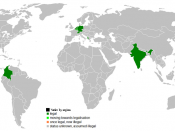Euthanasia is a highly debated subject in today's society. Philosophers argue whether assisting a person's death is morally right, and whether the government should prohibit the practice. The key issues behind these arguments involve the nature of the action, and the instances in which it occurs. The range includes passive voluntary euthanasia on one end of the spectrum and active involuntary euthanasia on the other. As the law stands right now, in most states any type of euthanasia is illegal. The philosophers protest against a paternalistic government, while the government argues the right to protect the sanctity of life. However, all these issues have no depth when it comes to the Jewish view on euthanasia. According to Jewish law, a life is on loan to a person from God. To assist in someone's death, to knowingly kill someone, or to take one's own life are all contrary to Jewish law and by that regard, are not morally permissible.
Euthanasia is defined as "mercy killing." Essentially, when we discuss euthanasia, we mean the act or practice of ending an individual's life in order to release him from an incurable disease, intolerable suffering, or an undignified death. This definition raises many important questions, however. From a moral standpoint, is it morally permissible to bring about the death of a terminally ill patient? Do we even have the right to a dignified death? Are we the best judges of what constitutes "intolerable suffering?" These questions are commonly debated through the breakdown of euthanasia into four distinct categories. First, non-voluntary passive euthanasia occurs when the
patient does not actually request to die; rather a trustee of some sort makes the request. In addition, no act of killing takes place, such as a gunshot or stabbing, but a patient is simply taken off life-support, or...


